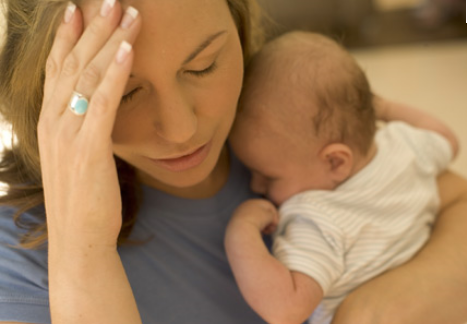
Post Natal Depression affects 1 in 10 women following the birth of their babies. Having a baby can be a time of great happiness and joy, however this isn't the case for everyone. Some women feel extremely low immediately after giving birth. The birth itself can be incredibly draining and exhausting and this only compounds how women feel. Post natal depression can be caused by many things, including a drop in hormone levels, fluctuating blood sugar levels and/or nutrient deficiencies. It can be caused by a drop in progesterone levels just before birth in women whose bodies are slow to begin making progesterone again.
Hormones such as cortisol and adrenaline which are released during birthing sap the adrenal glands which leave you feeling exhausted and drained. Anxiety about sleeping, about your baby feeding, coping with a crying baby and other sorts of other pressures and worries can make things feel worse. Often the realisation that your life has changed for good can be overwhelming.
Firstly, if you feel like you may have post natal depression, even if you're unsure, you should talk to your doctor to get a diagnosis. Sometimes it's relief to actually get a name for what you are feeling, rather than struggle on thinking that you are slowly going mad or that feeling very low is normal. Having post natal depression does NOT mean that you don't love your baby. It is an illness and one that can be helped. Once you've had your diagnosis, you can start to deal with the problem. This article is about how we can help ourselves through good nutrition and exercise but you must get a diagnosis from your doctor.
What Can We Do To Help Ourselves Through Food? (or what can you do if you're reading this and thinking of someone else?):
Foods To Avoid:
- Sugar
- Caffeine (including drinks such as Lucozade, Red Bull, etc)
- Alcohol
Reducing these stimulating foods will stop triggering the release of more cortisol (which is the stress hormone that causes the sap of adrenal glands leading to more exhaustion). Being a new mum often means that you reach for these foods first as you're so tired, but they are no good for recovery at all and will make you feel worse.
Foods to Increase
- Protein - fish, eggs, quinoa, lean meats or a good quality protein powder such as Sun Warrior
- Oily fish to provide omega 3 fats which are essential for brain fats (the brain is around 60% fats)
- Oats - porridge and wholemeal grains help to balance blood sugar
- Eat more lentils, brown rice, barley, chickpeas
- Vegetables - especially green vegetables
- Fruit, particularly berries
- Nuts & Seeds - omega 6 fats
- Turkey, avocado, cottage cheese, wheat germ, bananas - contains Trytophan to help raise serotonin levels
Tips for Helping Yourself With Nutrition
- Don't try and cut out everything in one go. In my opinion this can cause more stress and anxiety
- Try to eat a decent breakfast, lunch and dinner. If you snack badly around these meals then at least you have had the good stuff first.
- Gradually you'll find that as you cut down on unhealthier foods, you will crave the better, more healthier food and drinks.
- Keep yourself hydrated with plenty of water. If you must have a hot drink, try decaf tea, nettle or camomile or Tulsi tea (available in health food shops and most supermarkets)
- If you know you are not going to have a good day of eating, at least have a smoothie or juice. More vegetable than fruit, these are brilliant for new mums with limited time and thought for making meals. Think about getting as many nutrients into the body to help yourself heal and recover
- Always go for the unprocessed option. If you can't read the ingredients on the back of a packet, chances are it is not going to be good for you
- Batch cook meals wherever possible and freeze them for those days when you just cannot cook
Other Tips for Improving Your Mood
Get out of the house and into the sunlight. This is very important to increase your levels of vitamin from sunlight
Exercise is vital in the fight against depression.
Exercise & sunlight together = released endorphins which are natural anti-depressants
Try to get some more sleep, even if this means that you go to bed when your baby goes to bed! Arrange for your partner to help with feeds so you can get a block of sleep. This helps tremendously. If it isn't possible, then perhaps a friend or family member could look after your baby for a couple of hours so you can sleep.
Do talk to someone about how you are feeling. You are not alone. Post natal depression is very common and nothing to be ashamed of. It's important for you and your baby that you seek help and get yourself on the road to health again.
Yours in health,
Sam



